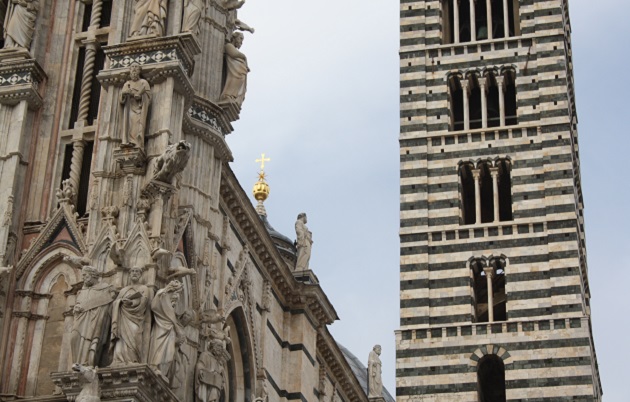Building Christian unity on baptism brings several challenges. In my corner of the world (Italy), a vast majority of people have been baptized and yet very few show any sign of appreciation of basic gospel truths.
 The Roman Catholic cathedral of Siena, in Italy. / J. Forster
The Roman Catholic cathedral of Siena, in Italy. / J. Forster
Unity is one of the most used and perhaps abused words in the present-day Christian vocabulary. The problem is that while the word is the same, its meaning may differ significantly according to who is talking about it.
Those who speak about unity may have the impression that they are talking about the same thing because they use the word “unity”, but the reality is that more careful attention is needed in order to avoid unpleasant pitfalls in understanding and communication.
The Ecumenical Week of Prayer which takes place in the second half of January is always an opportunity to focus on the different views of Christian unity that are promoted on a global scale. The general message of the Week (which is endorsed by the Roman Catholic Church and the World Council of Churches) is that unity is key for the present and future of Christian witness.
Emotionally, this message is very powerful and attractive given the various forms of persecution that Christians suffer in many parts of the world and given the rampant attacks of secularism against Christian values. In the audience on January 20th Pope Francis also made reference to unity, urging Christians of all confessions “to grow in that unity which is greater than what divides us”.[1] Fair enough, but what kind of unity is he talking about?
Unity Based on Baptism
Commenting on First Peter, the Pope gave a telling insight of the foundation of this unity. Here are his words: “In his Letter, Saint Peter encourages the first Christians to acknowledge the great gift received in Baptism and to live in a way worthy of it. He tells them: ‘You are a chosen people, a royal priesthood, a holy nation, God’s own people’. This Week of Prayer invites us to reflect on, and bear witness to, our unity in Christ as God’s People. All the baptized, reborn to new life in Christ, are brothers and sisters, despite our divisions. Through Baptism we have been charged, as Saint Peter tells us, ‘to proclaim the mighty works of the one who has called us out of darkness into his marvelous light’”.
This rather complex sentence about the foundation of the Christian life needs unpacking. The Pope makes several interesting points about unity here: 1. It is baptism that makes Christians one in Christ; 2. It is baptism that regenerates us; 3. It is baptism that makes us brothers and sisters; 4. It is baptism that commissions us to be witnesses of the mighty works of God.
This is the standard Roman Catholic doctrine whereby the most significant turning point in human life happens at baptism, ordinarily administered to infants. Whatever one thinks about this theology of baptism, the implications for Christian unity can be readily outlined: all those who have been baptized are one in Christ. Therefore unity must be sought, lived out and celebrated with all those who have received the sacrament or ordinance of baptism.
Building Christian unity on baptism, however, brings several challenges at various levels. In my corner of the world (Italy), for example, a vast majority of people have been baptized and yet very few show any sign of regeneration or even appreciation of basic gospel truths. Many baptized people are as secular or pagan or indifferent or even against any reference to the gospel as their non-baptized, non-Christian fellow citizens. How can Christian unity and brotherhood be based on baptism, then, when in most cases the people who received it consider it a meaningless act and totally removed from their lives?
Unity Among Believers
More importantly, theologically speaking, unity needs a more biblical foundation than baptism in itself. Rather than being granted through baptism, unity is a gift given to believers in Jesus Christ. According to First Peter, unity is a privilege of those who, having being elected by the Father and sanctified by the Spirit, obey the Son Jesus Christ (1:1-2). They are born again (1:3) and saved (1:5), waiting for their heavenly inheritance (1:4). These are people to whom faith has been granted and is now tested (1:7). This people who responded in faith to God’s initiative are “a chosen people, a royal priesthood, a holy nation, God’s own people”. In other words, unity is a corollary of the gift of salvation in Jesus Christ which is granted to those who believe in Him.
When the Pope speaks about unity as based on baptism, he stands on the ecumenical mainstream consensus about unity. The ecumenical view of unity posits the foundation of unity in the sacrament of baptism. But this view is practically faltering and biblically wrong. There is a far better way to appreciate and to celebrate Christian unity. As the World Evangelical Alliance’s statement of faith argues, we believe “The unity of the Spirit of all true believers”[2]. Unity is among believers in Christ. The Lausanne Covenant speaks of unity as it relates to those “who share the same biblical faith” (par. 7)[3], i.e. people who have made a public profession of their faith in the Jesus of the Bible. It is with fellow believers only that Christians can join in prayer asking God to help them “to maintain the unity of the Spirit” (Ephesians 4:3).
[1] The full speech can be accessed here: http://www.news.va/en/news/general-audience-of-20-january-2016-week-of-prayer
[2] http://www.worldea.org/whoweare/statementoffaith
[3] https://www.lausanne.org/content/covenant/lausanne-covenant

Las opiniones vertidas por nuestros colaboradores se realizan a nivel personal, pudiendo coincidir o no con la postura de la dirección de Protestante Digital.
Si quieres comentar o